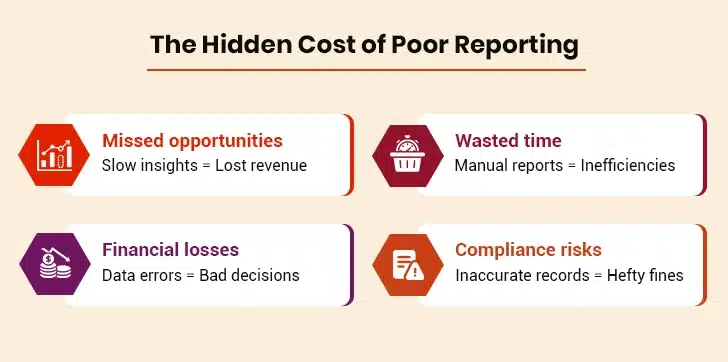Let’s be honest- —reporting is a real challenge. Businesses generate massive amounts of data, but transform it into clear, actionable insights? That’s a different story.
Interestingly, cleansing and preparing data collected from various sources to extract useful information is the crux that augments good decision-making and strategies. Companies need business intelligence (BI) tools to make sense of their data, identify key trends, and drive revenue growth.

This is where Power BI steps in. It bridges the gap between raw data and informed decision-making. It helps businesses create interactive dashboards, automate reports, and access real-time analytics—all with ease. Imagine spending less time wrestling with spreadsheets and more time making strategic moves. Sounds like a game-changer, right?
However, many businesses don’t know how to use Power BI. This is where Power BI consultants enter the picture. They offer the necessary expertise to help businesses overcome Power BI implementation challenges.
Let’s explore how Power BI experts streamline reporting and help businesses unlock the full potential of their data.
Why Businesses Need Intelligent Reporting?

I. Faster Decision-Making
Businesses need quick decisions to stay ahead. Without fast reports, leaders waste time in gathering data. Delayed insights slow down progress and cause missed chances. Intelligent reporting provides real-time data, helping teams act quickly. Instant updates help businesses respond to trends and risks. With clear reports, decision-making is strategic.
II. Fewer Errors in Data
Manual reports often have mistakes. Wrong numbers lead to bad choices and errors in sales, spending, or stock levels can hurt a business. Intelligent reporting automates data collection. It checks for mistakes and removes them. This ensures reports are accurate. With good data, businesses plan better and avoid costly errors.
III. Better Tracking of Business Growth
Companies must track progress to grow. Without clear reports, it’s hard to see what works. Growth slows when businesses don’t track sales, spending, and profits. Intelligent reporting shows key trends in real-time. It helps companies find strong and weak areas. Clear insights help them improve strategies and expand.
IV. Smarter Money Management
Tracking spending helps avoid waste. Without excellent reports, businesses may overspend or miss profit chances. Budgets can go off track, leading to losses. Intelligent reporting shows where the money goes. It highlights savings and alerts teams about budgetary risks. Businesses can manage cash flow better and stay profitable.
V. Stronger Customer Insights
Knowing what customers want is key to success. Without good data, businesses guess instead of plan. They may invest in the wrong products or miss customer needs. Intelligent reporting tracks buying habits and feedback. It helps companies improve services and products. Satisfied customers return and bring more sales.
VI. Better Team Performance
Businesses need to track employee performance. Without reports, managers can’t see who excels or who needs help. Poor tracking leads to unfair reviews and low morale. Intelligent reporting shows clear performance data. It helps reward good work and improve weak areas. This keeps employees motivated and productive.
VII. Smoother Operations
Every part of a business must run well. Without reporting, problems go unseen. Late deliveries, low stock, or slow production can harm success. Intelligent reporting tracks daily operations. It finds issues early so businesses can fix them fast. Smooth operations mean happier customers and better profits.
VIII. Stronger Risk Management
Every business faces risk. Without data, companies may not see problems until it’s too late. Sudden market changes, fraud, or legal issues can cause big losses. Intelligent reporting alerts businesses to risks early. It helps teams act fast to prevent problems. This protects profits and keeps businesses safe.
IX. Competitive Edge
Businesses need an edge to stay ahead. Without smart reporting, competitors may act faster. Outdated reports slow down progress. Intelligent reporting provides instant insights. It helps businesses make better choices and outsmart rivals. Stronger strategies lead to better market position and growth.
X. Easier Compliance and Reporting
Laws and rules change often. Without clear reports, businesses may fail audits or pay fines. Manual tracking makes compliance harder. Intelligent reporting automates record-keeping. It ensures that reports are correct and ready for review. This saves time, avoids legal trouble, and builds trust with stakeholders.
Use Power BI for Data Visualization and Analysis
Common Reporting Challenges and How Power BI Consultants Help
1. Data Silos and Fragmentation
Businesses store data in many formats and platforms, such as CRMs, ERPs, and spreadsheets. This makes it hard to get a clear picture. Teams spend hours combining data, which leads to mistakes. Different versions of reports cause confusion and poor decisions. Without a single source of truth, planning and analysis suffer.
Power BI consultants merge data from different sources into one place. They use built-in connectors to link cloud platforms, databases, and other apps. This removes duplicates and errors, ensuring that data is correct. Automated updates keep reports fresh. Teams can access real-time insights and make faster, better decisions.
2. Inaccurate and Incomplete Data
Mistakes in data entry, missing values, and duplicate records lead to wrong reports. Bad data causes poor choices, like wrong budgets or weak marketing plans. Teams waste time fixing errors instead of analyzing data. Inconsistent data leads to confusion and inaccuracies in tracking of goals.
Power BI consultants fix these issues with data cleaning tools. They use Power Query and DAX to remove duplicates, fill gaps, and check for errors. Automated checks ensure reports use correct data. With clean and reliable data, businesses make smarter choices and avoid costly mistakes.
3. Slow and Inefficient Reporting
Manual reporting takes too long and delays decisions. Employees spend hours gathering data instead of focusing on key tasks. By the time reports are ready, the data is old. Slow reporting makes it hard to react to changes and stay ahead of competitors.
A Power BI consultant automates reporting to save time. They set up live Power BI dashboards that update instantly. Built-in ETL tools pull data in real-time, eliminating manual work. Reports refresh on a schedule, ensuring teams always have the latest insights. Faster reporting leads to quicker, better decisions.
4. Poor Data Visualization
Spreadsheets and static reports are difficult to read. Too many numbers make it tough to find key trends. Without clear visuals, decision-makers miss important insights. Cluttered reports make it harder to focus on what matters.
Power BI implementation helps businesses access easy-to-read dashboards with charts and graphs. It uses colors and filters to highlight key insights. With interactive dashboards features, users better analyze details. Well-designed visuals help teams spot trends fast and make better choices.
5. Security and Compliance Risks
Without strong security, data is at risk of leaks and breaches. Companies may fail to follow laws like GDPR and HIPAA. A weak system allows unauthorized access, leading to legal trouble and loss of trust.
Power BI experts set up role-based access, encryption, and security rules. They limit who can see or edit reports. Power BI solution’s security tools help prevent leaks and ensure compliance. Stronger data protection reduces risk and builds trust with customers.
6. Lack of Real-Time Insights
Old data leads to slow decisions. Many reporting tools don’t update often enough. Delays make it hard to react to market changes or spot problems early. Without live data, companies miss growth opportunities and face higher risks.
Power BI consultants enable real-time data streaming. They use DirectQuery and live dashboards to provide instant updates. Businesses get alerts when key numbers change. Quick insights help teams act fast and remain proactive to challenges.
7. High Dependency on IT Teams
Many companies rely on IT teams for reports. Employees must wait for data from the IT teams. As IT teams become overloaded, it causes even more delays, limiting how fast teams respond to business needs.
A Power BI expert sets up self-service BI tools. Employees build reports with drag-and-drop tools and natural language search. Training helps teams use Power BI easily, reducing IT workload and speeding up decision-making.
8. Scalability Issues
As companies grow, the volume of data grows, and old systems struggle to keep up. Reports take longer to load, and some tools crash. Slow reporting hurts business performance and limits expansion.
Power BI consultants improve speed and scalability by moving data to the cloud using Power BI Service and Azure. Optimized models ensure fast report loading, even with large datasets. Businesses can grow without worrying about slow analytics.
9. Difficulty in Measuring KPIs
It is tricky to track key metrics with manual reports. Spreadsheets become outdated quickly, and errors creep in. Without accurate KPIs, teams struggle to measure success and improve performance.
A Power BI consultant sets up automated KPI dashboards. These update in real time and show clear, accurate data. Drill-through features let teams explore the details behind the numbers. With live KPI tracking, companies stay on target and make data-driven improvements.
10. Lack of Customization and Flexibility
Pre-built reports don’t always meet business needs. Generic dashboards miss key details. Without customization, teams can’t track the data that matters most.
Microsoft Power BI experts build custom dashboards that match business goals. They create unique metrics using DAX and Power Query. Custom reports help businesses track what matters most, leading to better insights and decisions.
11. Data Overload and Cluttered Reports
Too much data can be just as bad as too little. Reports packed with numbers and text make it hard to find key insights. Decision-makers may get overwhelmed and struggle to focus on what matters. Without a structure, reports become confusing and less useful.
A Power BI consultant simplifies reports by organizing data into clear, visual summaries. They use filters, drill-downs, and highlights to make key metrics stand out. Custom Power BI dashboards help teams focus on what’s important without distraction. This makes reports easier to read and speeds up decision-making.
12. Lack of Predictive Analytics
Many businesses rely on past data, but that’s not enough. Without forecasting, they can’t prepare for future trends. Relying only on historical reports can lead to missed chances and unexpected problems. Companies need predictive analytics to stay ahead.
Power BI experts set up AI-powered forecasting tools to predict trends. They use Power BI’s machine learning features to analyze past data and spot patterns. This helps businesses plan better, reduce risks, and take action before problems arise.
13. Difficulty in Collaboration
Teams often work on reports separately, leading to version conflicts. Without a shared platform, employees waste time fixing mistakes and merging data. Poor collaboration slows down decision-making and leads to inconsistent reporting.
Power BI experts set up Teams integration for real-time collaboration. Multiple users can work on reports simultaneously. Role-based access ensures data security while allowing smooth teamwork. This improves efficiency and keeps everyone on the same page.
14. Poor Mobile Accessibility
Many executives and employees need access to reports on the go. Traditional reporting tools don’t always work well on mobile devices. Poor formatting, slow loading times, and limited features make it hard to view data outside the office.
Power BI professionals optimize dashboards for Power BI Mobile. They create responsive layouts that work on any device. Mobile-friendly reports ensure users can track key metrics anytime, anywhere. This keeps decision-makers informed and ready to act.
15. Lack of Integration with Other Business Tools
Many businesses use multiple tools, such as CRMs, ERPs, and marketing platforms. If reports don’t connect with these tools, employees are required to export and merge data manually. This leads to errors and delays.
Proper Power BI implementation also involves integration with existing business software. The consultants use APIs and built-in connectors to link data sources. Automated syncing keeps all reports up to date. This eliminates manual work and ensures seamless data flow across systems.
Conclusion
Power BI implementation helps organizations to gain an edge in business intelligence with real-time data analytics and visualizations, its deployment and implementation require expertise. Partnering with a Power BI consulting company for integration services helps companies focus on core business goals while overcoming Power BI challenges.





